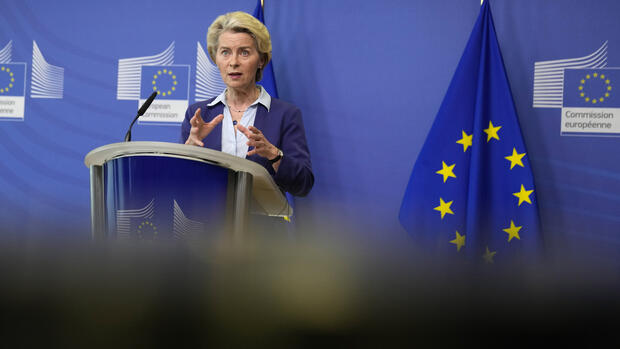The EU Commission President warns: The world has changed dramatically in recent years.
(Photo: AP)
Brussels The EU has published a strategy for economic security for the first time. The 15-page paper by the EU Commission is primarily aimed at China, even if the country is not explicitly mentioned. The guiding principle is simple: Europe must not contribute to strengthening the People’s Republic militarily – and should not be open to blackmail in the event of a crisis.
The world has changed dramatically in recent years, said Commission President Ursula von der Leyen (CDU) on Tuesday in Brussels. The new geopolitical developments have revealed vulnerabilities in the European economies.
Therefore, the Commission now considers a “derisking” of the supply chains to be necessary. The authority wants to reduce Europe’s dependence on China in three areas:
- Foreign investments in Europe are to be controlled more closely. Since October 2020, more than a thousand transactions have already been checked. However, so far only 19 of the 27 member states are participating. The Commission is calling on the rest of governments to do the same. She also wants to revise the rules again by the end of the year.
- More export controls for “dual-use goods”, i.e. goods that can be used for civil and military purposes. The Commission, together with the Member States, wants to draw up a black list by September, which, in addition to semiconductors, should also include technologies for quantum computers and artificial intelligence. In Brussels, the central lesson of the Ukraine war is that rivals like Russia and China must not have access to advanced Western technology.
- Outbound Investment Screening: Safety-critical EU investments abroad could be banned in the future. The Commission first wants to initiate a discussion with the governments and present a first “initiative” at the end of the year. A draft law is likely to be a long time coming.
Von der Leyen emphasized that the EU does not fundamentally question free trade. It’s just about preventing certain key technologies from being used militarily by rivals. The EU needs a strategic vision of how to deal with these risks. And they must use the existing trading instruments more confidently.
Commission must convince skeptical capitals
The paper makes it clear that the Commission still has a lot of convincing to do in the capitals. Because a number of governments have reservations about restrictions on trade with one of their most important trading partners, not least Germany. They want to prevent the EU from swinging too much towards the USA’s sharper course on China.
In particular, the planned control of European investments abroad is met with resistance. That is why the Commission emphasizes that the discussion is still at the very beginning. Commission Vice-President Margrethe Vestager recently told the Handelsblatt that the topic was “tricky” because European companies were among the largest investors in the world.
So far, each member state has decided for itself which goods may be exported and which investments it allows. With the EU strategy, the Commission now wants to arrive at a joint risk assessment. She emphasizes that it is not about transferring responsibilities from the capitals to Brussels. Rather, it is about a joint analysis and better coordination of the trading instruments.
In the case of export controls, for example, stronger coordination at EU level is urgently needed because different national approaches create loopholes and undermine the effectiveness of export controls, the paper says.
Bütikofer demands institution for economic security
Experts are skeptical about the strategy’s effectiveness. Tobias Gehrke of the European Council on Foreign Relations (ECFR) said the commission’s derisking strategy was insufficient to address one of the main problems: the struggle for technological-industrial dominance between China and the US.
The EU must identify the areas where it has a technological advantage and then direct its trade and security policies to defend it. The division of tasks between the EU Commission, which is responsible for trade, and the Member States, which are responsible for security, is increasingly “inadequate”.
The Green foreign politician Reinhard Bütikofer called for a new institution responsible for the implementation of the economic security strategy. The MEP cited the Ministry of Economic Security in Japan as a role model. A concrete agenda is also needed for the next commission, which will be set up after the 2024 European elections, he said.
Bütikofer’s party colleague Anna Cavazzini, who heads the internal market committee in the European Parliament, said defensive instruments like the ones proposed are important. “But we must also focus on active proposals to increase the EU’s resilience,” she said. The development of a European circular economy must be a central element of future economic security policy.
More: Von der Leyen moves away from free trade
